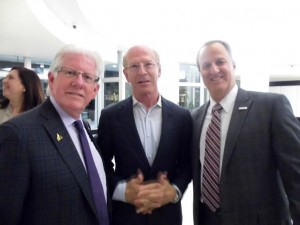Proponents and opponents of the proposed Miami Beach convention hotel voiced their opinions Tuesday night, as the proposed 288-foot-tall hotel was debated during a packed meeting of the West Avenue Neighborhood Association (WAvNA).
Residents also heard an update from the developer of the new Monad Terrace, which will bring two new towers to the area.
On March 15, during the presidential primary, Miami Beach voters will have a chance to vote on whether or not the city should give a 99-year-lease to Portman Holdings for the hotel. That lease will enable the Atlanta-based company to build the 800-room hotel on city-owned land adjacent to the Fillmore Miami Beach at the Jackie Gleason Theater. The lease must be approved by 60 percent of the Beach electorate to pass.
William Talbert, president of the Greater Miami Convention and Visitors Bureau, argued that the hotel is a needed component of the Miami Beach Convention Center, a 57-year-old, 1 million-square-foot facility that’s now undergoing a $600 million taxpayer funded renovation.
“If we make this public investment, we need to finish the job,” Talbert said. “We need an adjacent headquarter convention hotel.”

William Talbert, Jack Portman and Michael Goldberg
Michael Goldberg, chairman of the Miami Beach Chamber of Commerce, noted that the $400 million convention center hotel will be “100 percent privately funded” unlike West Palm Beach’s convention hotel. The Related Companies, which developed the $127 million Hilton West Palm Beach Hotel, received a $27 million subsidy from Palm Beach County.
Goldberg also claimed that the hotel would create 440 permanent hotel jobs, 530 local full-time construction jobs, and 500 “supporting jobs outside the hotel.”
And then there’s the revenue. Jack Portman, vice chairman of Portman Holdings, said his hotel will be paying resort taxes, property taxes on the leased property, and 2.5 percent of the gross profits as rent. That will amount to an average of $24.6 million a year in lease and tax payments during the 99-year-lease, Portman argued. Those funds have been earmarked by Miami Beach officials for education, undergrounding utilities, transit improvements, and flood mitigation.
But Mike Vazquez, a retired North Beach resident opposed to the hotel, said that the city’s own numbers indicated that Miami Beach could only expect to receive $800,000 a year for the leasing of public land for the first ten years. “The deal we have in front of us is not a great deal,” Vazquez said.
Vazquez wasn’t alone. Several other residents spoke out against the proposed hotel, fearing that the traffic it will generate will further clog Miami Beach’s already congested roads.
Bill Hahne, a real estate broker who lives on Belle Island, said he’s had trouble obtaining reliable information on the hotel, which he believes is way too large for South Beach. “This is not a good deal. It’s a scary deal,” Hahne told the audience “…As a resident, I beg you to vote ‘no.’ We can do better.”
WAvNA board member Irma Larancuente said her colleagues have yet to make a recommendation on the convention hotel.
Also during the meeting, New York developer Michael Stern unveiled his latest plans for Monad Terrace, a private South Beach street once lined with small apartments and houses that Stern obtained for $41.9 million last summer.
The proposed bay-front condo building, designed by French architect Jean Nouvel and local architect Kobi Karp, will include a lagoon, private pool balconies, vegetation growing on the building’s mesh, underground parking, and a juice bar. The future project will consist of two wings: one 150 feet in height, the other 90 feet tall. The entire building will have anywhere from 53 to 70 residences, Stern told The Real Deal. The price of the units is yet to be determined. “I haven’t priced them yet,” Stern said.
Stern said he hopes to obtain permits for the project as early as June. From there, the Monad Terrace building will take 18 to 21 months to build, Stern said.
Larancuente said Stern’s project received WAvNa’s endorsement in mid-February.
